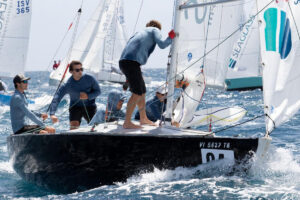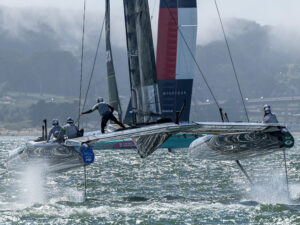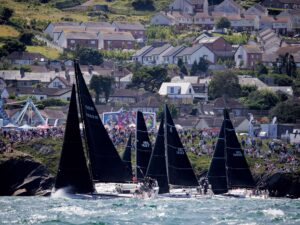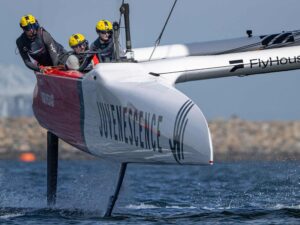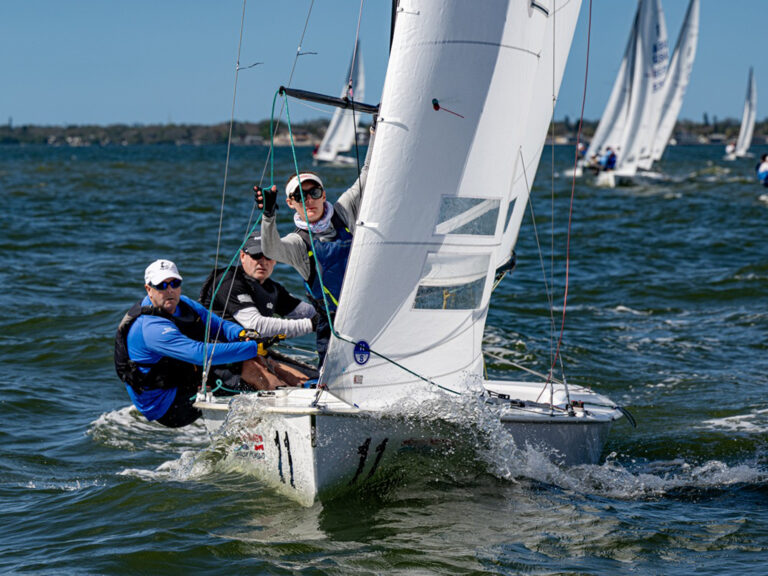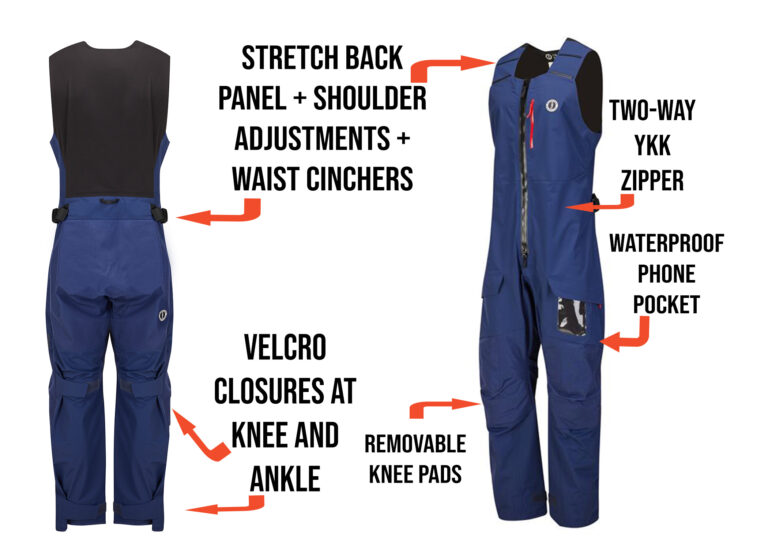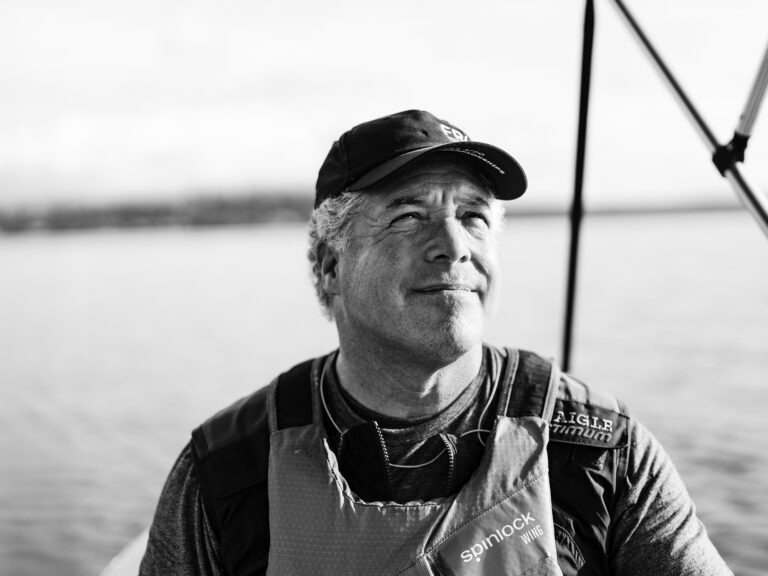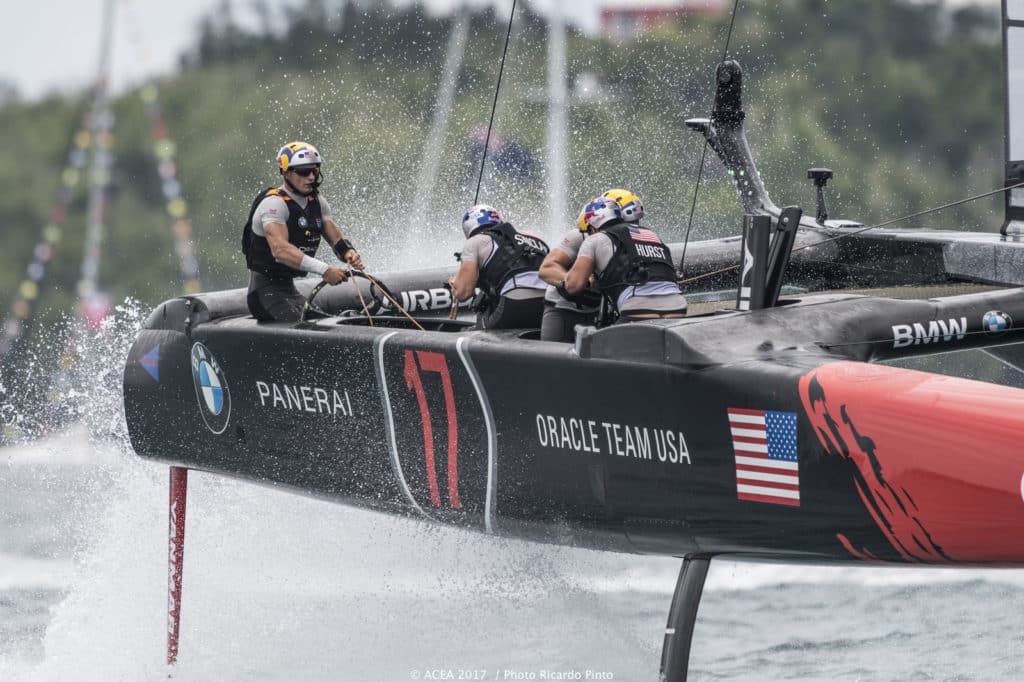
First things first: Oracle Team USA was faster today. That much everyone here in Bermuda can agree upon.
Oracle’s five-day work week did them well to stop the bleeding of this 35th America’s Cup match and now that the series has resumed, we have proper regatta.
What was “left on the table,” after last week’s trouncing Mr. Spithill wouldn’t say at the post-race press conference, but ask around the America’s village enough and most reliable sources point to Oracle’s rudders as a major change. Word is they gone to minimal surface area on the elevators. The tradeoff in this area, I’m told, is “grip” versus drag on the weather rudder. Grip delivers better righting moment and righting moment is speed.
Excessive grip, however, is drag. As we all know, drag is slow.
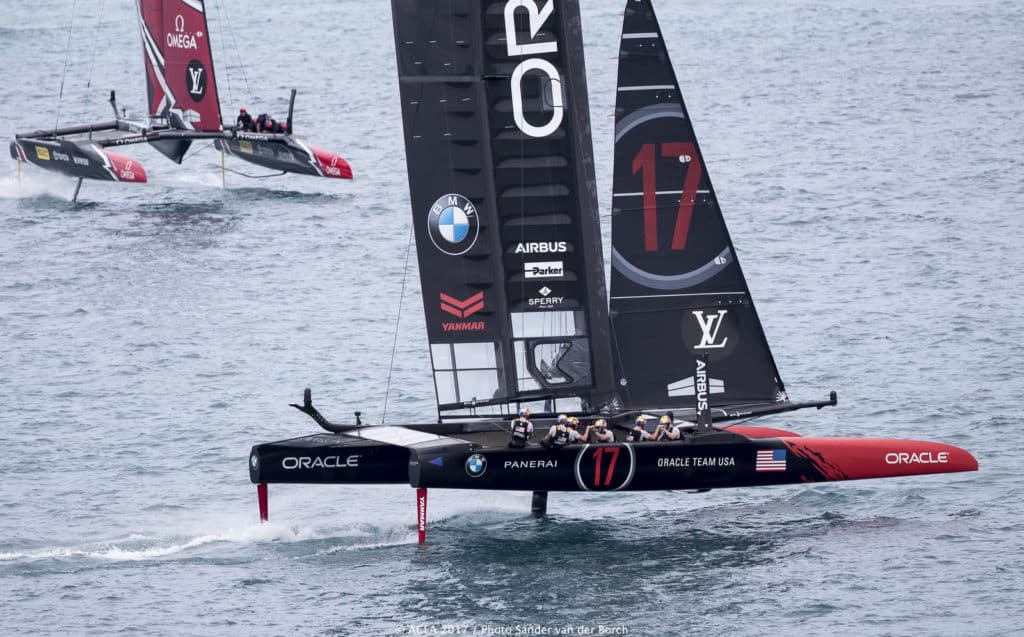
The corollary is that less grip also makes the AC50 skittish, and in the day’s first race, that’s exactly how USA 17 looked into and out of maneuvers. The boat appeared to behave much differently in the second race, perhaps as a result of changes to the rudder “differential” (angle) between races. With an allowance of 3 degrees of fore-and-aft adjustment, a 1-degree tweak can make a world of difference in regaining that grip, and restoring confidence in the boat.
And that confidence was the most noticeable difference between the two races of the day, that and the noteworthy historical point that the defender led at Mark 1 for the first time in this 35th Match.
“Let’s get into them boys,” was Mr. Spithill’s call to action to his crew before entering the starting box of the second race. Emirates Team New Zealand came in with the favored port entry and Oracle arrived late to the party, setting up the advantage to Team New Zealand. Spithill tried his best to get a hook as they made their way toward the pin end, but the Kiwis foiled across their bow before both boats turned hard to starboard with New Zealand in the controlling leeward position. It looked to be another repeat Kiwi takeoff, but Oracle popped up quickly, and had just enough pace to inch ahead.
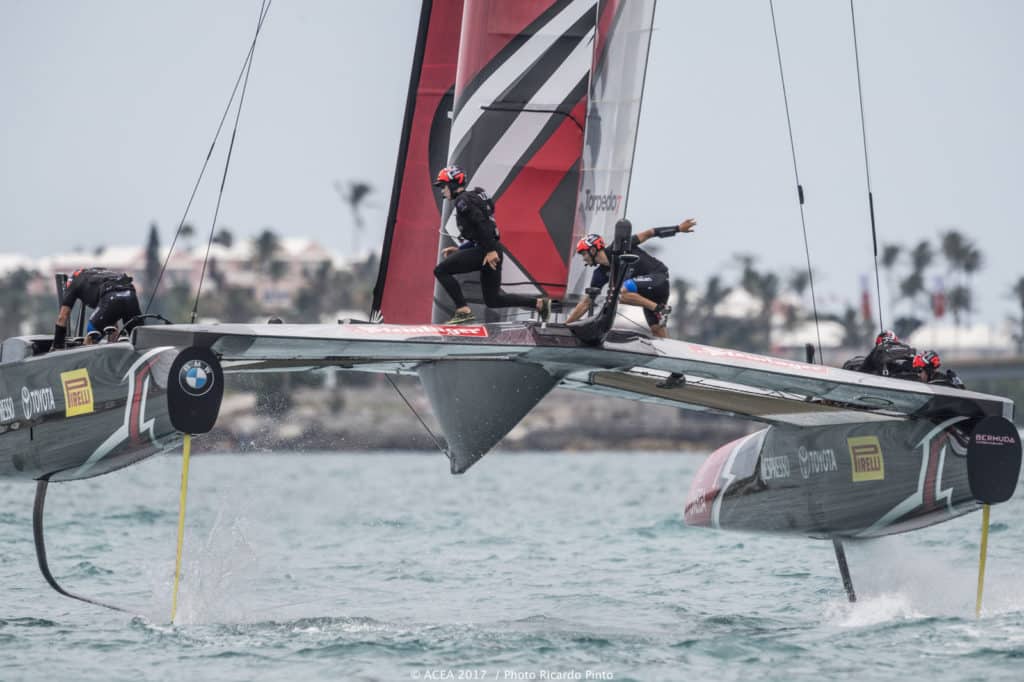
With a better angle into Mark 1, Oracle had better pace a 3-second lead. Fifty meters separated the two as they neared the boundary on starboard. Exiting the first jibe, Team New Zealand squirted ahead. Oracle hooked into its puff and closed the gap, pulling the proverbial rubber band taut.
Finally, the America’s Cup village and flag wavers in the grandstands had the makings of a yacht race. Oracle was faster and lower, revealing a downwind mode we have not yet seen. Into and around the right-hand gate Spithill went with Burling sniffing his transom.
The Kiwis, not one to follow in anyone’s wing wash, wasted no time tacking away and creating the critical split, using the efficiency of their wing and control to maneuver at will and without consequence.
As Oracle sailed clear across the Kiwi boat on their first cross, Spithill shot a few glances over his shoulder, perhaps enjoying this new view of the racecourse; bows, not transoms. Boundary to boundary, Oracle remained in control, with a hint of better speed and clean maneuvers. For the first time in the Match, they led at Mark 3, rounding the left-hand gate (upwind) to cheers ashore.
Twelve seconds and 250 meters separated the two as they started Leg 4 and Oracle continued to pad its lead. Not something we’re used to seeing here. It was all looking good for Mr. Spithill and Co., but lo and behold, as Oracle made its final jibe into the next gate (overstood Mr. Spithill would later admit at the press conference) Team New Zealand were sailing straight down the course and into the gate, taking the lead, thank you very much.
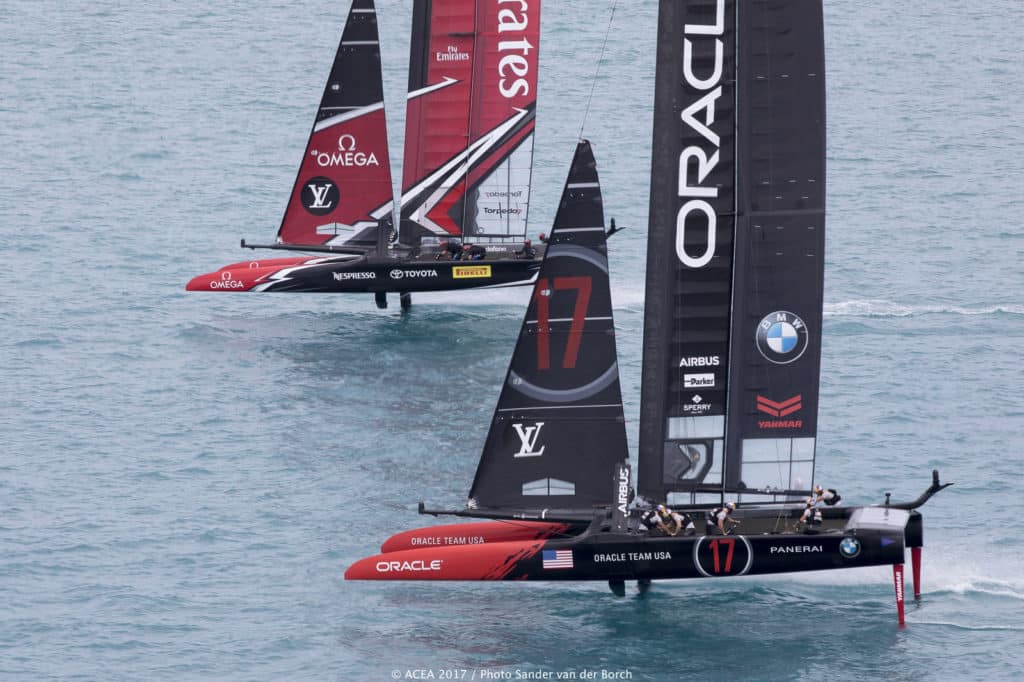
Oracle followed round but promptly tacked left to get a split. The Kiwis managed the covering game again, putting 50 meters between them and appearing to cruise to another win. But up the beat, with a few more splits and crosses, the New Zealanders controlled the first dial-down on starboard, but the umpires waived it, springing Oracle to the right to the right-hand boundary and setting them up for the next race-changing dial-down at the top of the course.
New Zealand, on port, turned down hard at the last minute, which pushed them shy of their layline to the right-hand mark. Oracle took control of the race from there, extending on the run to Mark 6 and into the finish for an 11-second win.
Turning of the tide?
It’s way too soon for Oracle Team USA fans to start having visions of San Francisco, but Mr. Spithill was quick to seize upon the victory at the press conference.
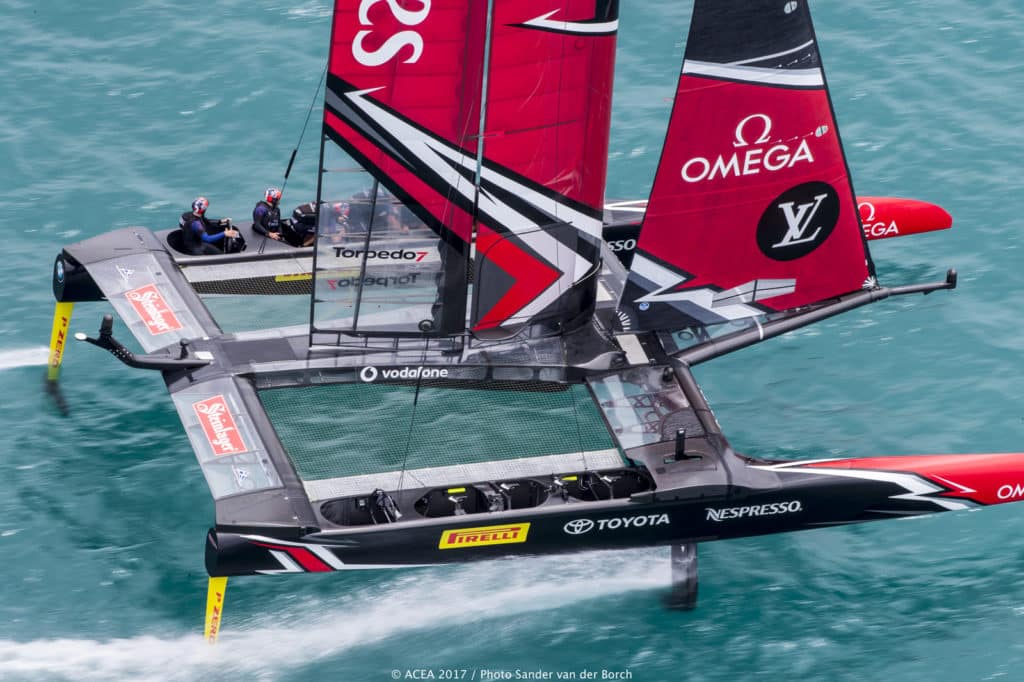
“We’ve worked hard this week and we saw these guys (nodding to Peter Burling) take days off and made a commitment that we’d make the boat faster. We saw that today. We’re not sailing as well as we should be. Even in the second race we had a pretty good lead and lost it again, but it’s good to be able to come back from a race like that. The point is the boat is faster.”
And what of the first race? Emirates Team New Zealand was surgical in its 2-minute win. There is a long list of critical moments where Oracle shot itself in the foot, starting with an over early penalty (Spithill says their software thought otherwise), and three noticeably bad jibes where they dropped off the foils.
But the big one was the penalty they picked up in a crucial dial down at the top of Leg 3.
Rewind the race footage and it’s now easy to see that as soon as Oracle dropped its board for a tack back to the middle of the course from the left-hand boundary, Peter Burling knew exactly what to do. He bore away sharply to set up the dial-down early and make it that much more difficult for Spithill to avoid the altercation when the two boats met.
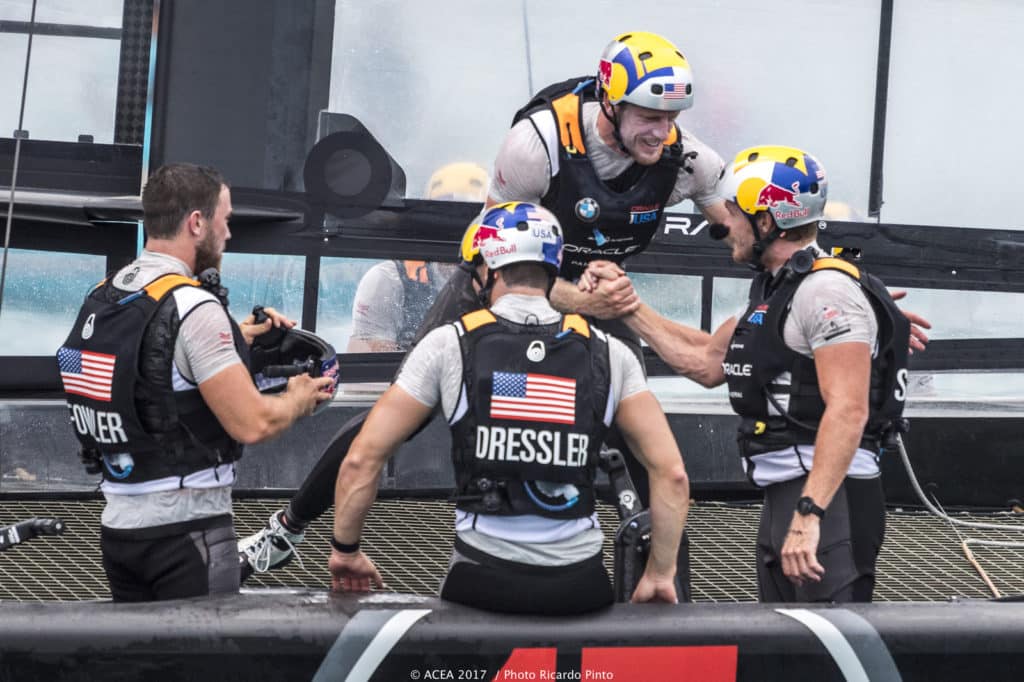
As Oracle turned up past the stern of the Kiwi boat, tactician Tom Slingsby alerted Spithill of the penalty. “We’ve got a penalty?” he responded incredulously. “I was altering the whole way!”
But that’s not how the umpires saw it.
Spithill pleaded his case at the post-race press conference: “We had them altering the whole time and yes we are frustrated with the penalty. We just feel like these guys have been given a few soft penalties. We had one in the first race of the qualifiers against us that they should have gotten at the top mark and the umpires admitted that and we saw what happened in the Artemis race—they were give them one there. Seems like they are getting some soft ones from the umpires.”
To better understand the port boat’s perspective (dial-down explained here), I asked SoftBank Team Japan tactician Chris Draper, who explained that coming out of tack (as Oracle did) and going right into the dial down is tough. “It’s hard for the port boat because you can’t see the other boat through the wing,” said Draper, “But, I think New Zealand did a good job selling it, too. They did it right by starting the dial down early, getting down to Oracle’s line so that it would make it really hard for them to do it properly. Turning up, as New Zealand did, creates the illusion that they had to maneuver to avoid.”
Draper agrees the umpires gifted New Zealand that one, but Burling says it was he who gave that race away. “My fault with the shifts up at the top to give it back to them,” he said, “but it’s who sails their boat better will win… and it’s good to see a bit of fight from these boys.”

